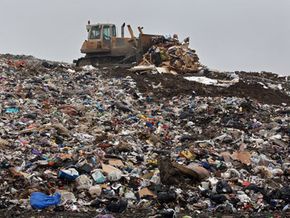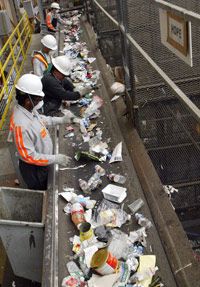As the waste collectors cart your recyclables away, you’re suddenly hit by some terrible questions: Where do those materials go once they're picked up? Will they will actually be recycled? How do you know they’re not just going to end up in a landfill?
The movement to urge Americans to recycle the products they use rather than simply toss them in the garbage has been one of the most successful public relations campaigns ever launched in the country. In 1973, University City, Mo., was the first city to begin a curbside recycling program for newspaper collection. By 2006, there were around 8,660 curbside recycling programs across the United States [source: EPA].
Advertisement
At first, people had to separate their recycling. Plastics went in one bin, glass in another, paper in a third. But with the introduction of single-stream collection, people can put all of their recyclables in one place. With such a radical shift from deliberate sorting to a hodge-podge method, it appeared that recycling collection companies were confirming a skeptic's subtle fear: Our recyclables aren’t actually being recycled. What’s worse, the companies seemed to have stopped even trying to keep up appearances.
But this change to single-stream collection is the result of a change in technology. Better equipment was developed that sorts through our recyclables for us. Magnets and electric currents separate different metals, while infrared lasers sort different kinds of paper and plastic containers from one another, based on the light wavelength each type of material emits.
Unless you follow your recyclables through the entire process until they're made into new products, it’s impossible to say for certain whether your materials are actually being recycled. But, logically, the reason you can feel assured that most of your recyclables actually get recycled is because they have a dollar value.
Recyclables are considered a commodity -- a good that can be sold. Those cans, bottles and boxes you recycle can be broken down into raw materials again and sold to manufacturers. And since consumers like products made from recycled materials, manufacturers buy more recycled materials for their products. This means the prices for these commodities increases, which means recycling programs remain feasible.
So recyclables are valuable. Trash, on the other hand, is not. In fact, waste companies are generally charged fees for the right to dump their waste collections at landfills. And really the only difference between trash and recyclables is what happens after they’re picked up. So ultimately, it would be a terrible business model for a waste management company to pick up your recyclables and simply dump them in a landfill.
This is not to say that everything you put in your recycling bin actually does get recycled. And there have been some very high-profile cases of recycling fraud. Learn more on the next page.
Advertisement

